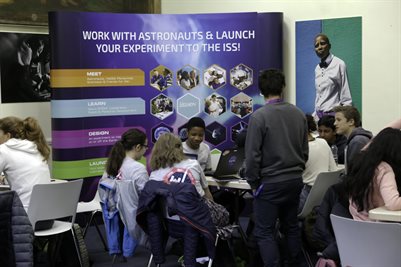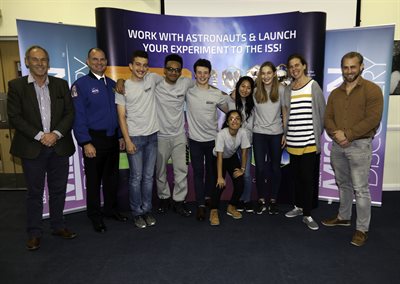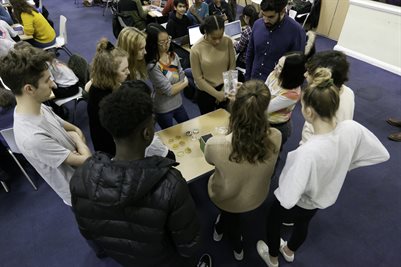Students design science experiments to be launched into space
Over 60 students spent a week (22-26 October 2018) at King’s designing experiments to be carried out on the International Space Station (ISS) as part of Mission Discovery.

Mission Discovery is an opportunity for students aged 14-18 to spend time working with an astronaut, world renowned scientists and NASA leaders to create ideas for experiments that might be able to be carried out in space.
The programme has been running since 2012 and is managed by The International Space School Educational Trust (ISSET) and Dr Julie Keeble from the Centre for Human & Applied Physiological Sciences and ISSET Chief Scientist.
Working together, 11 teams of students spent the week designing experiments and learning about scientific collaboration. The groups of students were mentored by current King’s PhD students as well as Tony Antonelli, an ex-NASA astronaut and Dr Keeble who guided them through the process of designing experiments, polishing ideas and presenting to a judging panel.

(Winning team 'Apollo 10' with the Tony Antonelli, Dr Juli Keeble and ISSET programme co-ordinators)
The winning team ‘Apollo 10’ designed an experiment that will measure the rate of cell division in space using green fluorescent protein. The members of the winning team are Weijia Gao, Anya Anwar, Sean Carty, Rosie Quint, Kieran Youssef and Jack Dalton. Their experiment will be built by Dr Keeble and colleagues at King’s and NASA, launched to the ISS and carried out by the astronauts on board.
Anirudh, 16, a student from Blackburn said:
“the week had been really good especially discovering what it is like to be an astronaut and their lifestyle. It has reinforced my love for science and confirmed I want to study it in the future!”
Ava, 14, from London said the week had been
“intriguing and fun but the best part was the bonding and teamwork”

During the prize-giving ceremony, Mr Antonelli told the students that
“coming together as a team, researching scientific projects and standing in front of a whole room is a tremendous achievement and the skills learnt this week will apply to the rest of your life. You are the next generation and we are counting on you to make the world a better place”.
King’s PhD student Olatz Mompeo from the Department of Twin Research & Genetic Epidemiology mentored three teams throughout the week and said:
“the students were very motivated, and it was encouraging for myself and my own research”